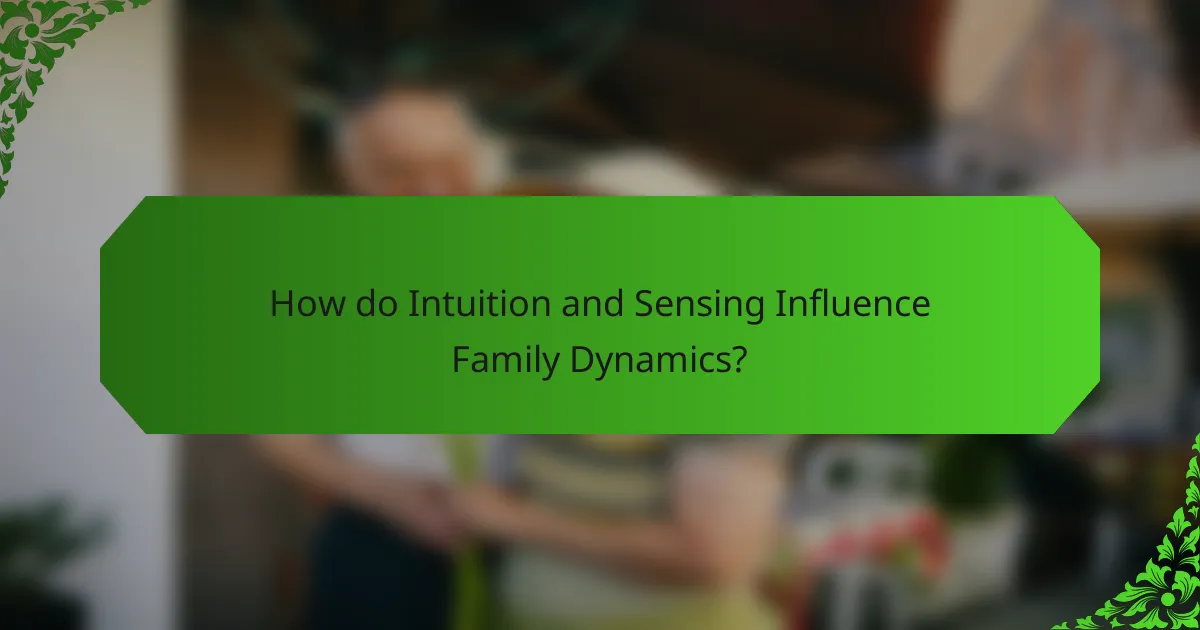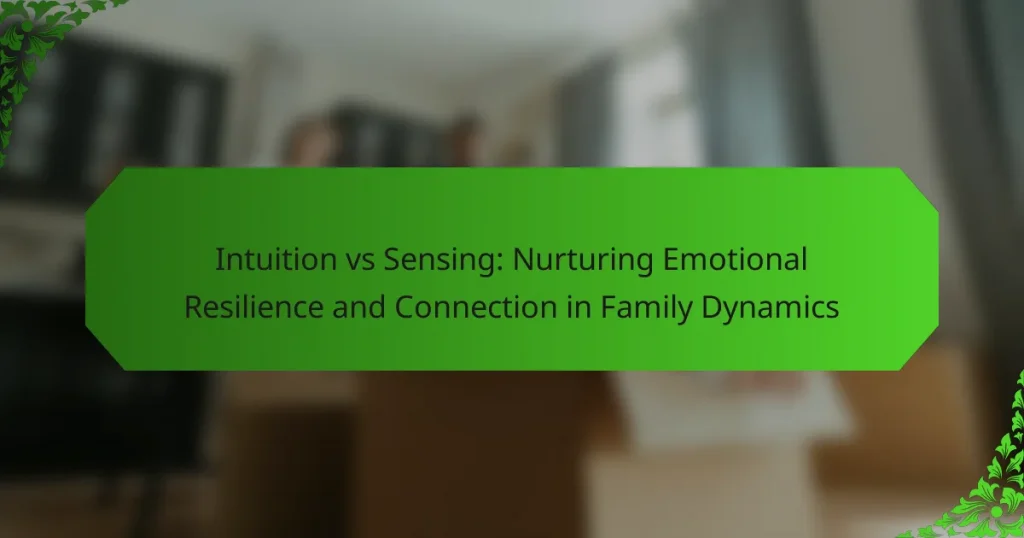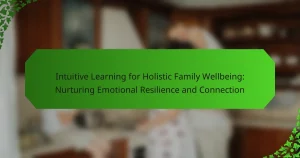Understanding the balance between intuition and sensing can enhance emotional resilience and connection within family dynamics. Intuitive members foster empathy and future possibilities, while sensing individuals address practical needs and stability. This interplay promotes effective communication and problem-solving, allowing families to navigate challenges more successfully. Recognizing these differences strengthens familial bonds and nurtures both emotional and practical aspects of relationships.

How do Intuition and Sensing Influence Family Dynamics?
Intuition and sensing significantly shape family dynamics by influencing emotional resilience and connection. Intuitive family members often foster understanding and empathy, while sensing individuals prioritize practical needs and present realities. This balance can enhance communication and problem-solving within the family unit.
Intuitive individuals tend to focus on possibilities and future outcomes, encouraging family members to explore new ideas and emotional depths. In contrast, sensing individuals contribute by ensuring that daily routines and tangible needs are met, creating a stable environment.
The interplay between these attributes can lead to a well-rounded family dynamic. For instance, intuitive insights can help navigate emotional challenges, while sensing skills ensure that family members feel secure and grounded. This synergy promotes emotional resilience, allowing families to adapt to changes and conflicts more effectively.
Ultimately, recognizing and valuing both intuition and sensing can strengthen familial bonds. Families that appreciate these differences can cultivate a supportive atmosphere that nurtures both emotional and practical aspects of their relationships.
What are the key differences between Intuition and Sensing?
Intuition and Sensing differ fundamentally in how individuals perceive and process information. Intuition focuses on patterns, possibilities, and abstract concepts, while Sensing emphasizes concrete details and present realities.
Intuitive individuals often excel in envisioning future scenarios and making connections between disparate ideas, fostering creativity. In contrast, Sensing types prioritize facts and hands-on experiences, enhancing practical problem-solving.
These differences significantly influence family dynamics. For example, Intuitive family members may encourage imaginative play and exploration, while Sensing members ensure routines and structure are maintained.
Understanding these contrasting styles can nurture emotional resilience and connection within families, allowing for balanced interactions and mutual support.
How do Intuition and Sensing impact emotional resilience?
Intuition and Sensing significantly influence emotional resilience by shaping how individuals process experiences. Intuitive individuals often rely on gut feelings, fostering adaptability in emotional challenges. In contrast, Sensing individuals focus on concrete details, enhancing stability and grounding in family dynamics. This interplay allows families to navigate emotional landscapes effectively, combining flexibility and structure. Emotional resilience thrives when both perspectives are valued, promoting deeper connections and understanding among family members.
What role does each play in conflict resolution?
Intuition fosters empathy and understanding, while sensing emphasizes facts and details in conflict resolution. Intuition allows family members to navigate emotional landscapes, enhancing connection. Sensing provides clarity, ensuring all perspectives are acknowledged. Balancing both approaches nurtures emotional resilience and strengthens family dynamics.
How can these traits affect communication styles?
Intuition and sensing traits significantly influence communication styles within family dynamics. Intuitive individuals tend to focus on abstract concepts, fostering imaginative discussions. In contrast, sensing individuals prioritize concrete details, promoting practical exchanges. This divergence can lead to misunderstandings if not managed. For example, intuitive family members may feel stifled by the sensing focus on specifics, while sensing members might perceive intuitives as vague. Balancing these styles enhances emotional resilience and connection, enabling families to navigate differences effectively. Understanding these traits can improve empathy and reduce conflict, creating a more harmonious environment.
What are the universal characteristics of Intuition and Sensing?
Intuition and sensing are characterized by distinct cognitive processes. Intuition focuses on abstract patterns and future possibilities, while sensing emphasizes concrete details and present realities. Both play crucial roles in emotional resilience and connection within family dynamics. Intuition fosters creativity and long-term vision, enhancing problem-solving. Sensing provides stability and groundedness, supporting immediate needs and practical solutions. Balancing these characteristics nurtures healthy family relationships and promotes emotional well-being.
How do these traits manifest in family interactions?
Intuition and sensing manifest in family interactions through distinct communication styles and emotional responses. Intuitive family members often focus on future possibilities, fostering imaginative discussions. In contrast, sensing individuals emphasize present realities, promoting practical problem-solving. This dynamic can enhance emotional resilience by balancing visionary thinking with grounded actions. Families that recognize and appreciate these traits develop deeper connections, allowing for a more empathetic understanding of each other’s perspectives. As a result, emotional support becomes more tailored and effective, strengthening family bonds.
What unique benefits do Intuitive and Sensing family members bring?
Intuitive and Sensing family members enhance emotional resilience and connection through distinct approaches. Intuitive individuals foster creativity and vision, encouraging open communication and exploring possibilities. Sensing family members bring practicality and attention to detail, grounding discussions in reality and ensuring emotional needs are met through tangible support. Together, they create a balanced dynamic that nurtures understanding and adaptability, essential for a resilient family environment.
How can Intuition foster creativity in family problem-solving?
Intuition enhances creativity in family problem-solving by promoting open communication and emotional understanding. This process encourages family members to express their feelings and ideas freely, fostering a collaborative atmosphere. Intuition allows families to tap into shared experiences, leading to innovative solutions that might not emerge through logical reasoning alone. As a result, families can build stronger emotional connections, enhancing their overall resilience.
In what ways does Sensing enhance practical decision-making?
Sensing enhances practical decision-making by grounding choices in real-time observations and tangible experiences. This approach fosters clarity and reduces ambiguity, allowing individuals to respond effectively to immediate situations. By focusing on concrete details, Sensing cultivates confidence in decision-making, promoting emotional resilience within family dynamics. This unique attribute of Sensing supports stronger connections, as decisions are made based on shared experiences and mutual understanding.
What are the rare attributes of Intuition and Sensing in family settings?
Intuition and Sensing exhibit rare attributes in family settings that enhance emotional resilience and connection. Intuition fosters holistic understanding, enabling family members to anticipate needs and emotions. Sensing emphasizes present-moment awareness, strengthening bonds through shared experiences. These attributes create a balance, promoting healthy communication and deeper relationships.
How do these traits contribute to unique family traditions?
Intuition and sensing traits foster unique family traditions by enhancing emotional resilience and connection. Intuitive family members often encourage creativity and exploration, leading to innovative traditions. Sensing individuals provide stability and detail-oriented planning, ensuring traditions are meaningful and memorable. This balance nurtures a supportive environment where each member feels valued, reinforcing family bonds. As a result, these traits contribute to a rich tapestry of shared experiences that define a family’s identity.
What uncommon challenges do families face with these traits?
Families face unique challenges when balancing intuition and sensing traits. These challenges include miscommunication, emotional disconnect, and differing decision-making processes. Intuitive family members may prioritize abstract ideas, while sensing individuals focus on concrete details, leading to misunderstandings.
Emotional resilience can be tested when intuitive members feel unrecognized for their insights. Conversely, sensing members may struggle with the abstract nature of intuitive perspectives. As a result, families must actively cultivate emotional connection through open dialogue and mutual respect.
Additionally, the differing processing styles can create tension during conflict resolution. Intuitive individuals may seek innovative solutions, while sensing members prefer practical approaches. This divergence can hinder collaborative problem-solving, necessitating a shared understanding of each other’s strengths.
To foster emotional resilience, families should embrace both traits as complementary. Recognizing the value in diverse perspectives can enhance connection and strengthen family dynamics.
How can families nurture emotional resilience through these traits?
Families can nurture emotional resilience by fostering traits such as empathy, communication, and adaptability. These traits enhance connections and support emotional growth.
Empathy allows family members to understand each other’s feelings, creating a safe space for sharing emotions. Open communication encourages expressing thoughts and concerns, which strengthens relationships. Adaptability helps families navigate challenges together, promoting resilience.
Research shows that families who prioritize these traits experience lower stress levels and improved emotional well-being. By modeling and practicing empathy, communication, and adaptability, families build a strong foundation for emotional resilience.
What practical strategies can be implemented?
To nurture emotional resilience and connection in family dynamics, implement strategies like open communication, active listening, and shared activities. Encourage family discussions about feelings to strengthen bonds. Establish routines that promote togetherness, such as family meals or game nights. Use conflict resolution techniques to address disagreements constructively, fostering understanding and empathy.
How can families create a balanced environment for both traits?
Families can create a balanced environment for both intuition and sensing by fostering open communication and understanding. Encouraging discussions about feelings and experiences nurtures emotional resilience. Incorporating structured routines alongside spontaneous activities helps blend both traits. Family activities should include both analytical problem-solving tasks and creative expression opportunities. This combination allows each family member to thrive in their preferred style while promoting connection.
What common mistakes do families make regarding Intuition and Sensing?
Families often overlook the balance between intuition and sensing, leading to misunderstandings. Common mistakes include dismissing emotional insights, prioritizing logic over feelings, and failing to validate each member’s perspective. This can create emotional disconnects and hinder resilience. Additionally, families may not recognize the unique attributes of intuitive and sensing individuals, leading to conflict. As a result, fostering open communication and understanding these differences is crucial for nurturing emotional resilience and connection.
What expert insights can enhance family dynamics related to these traits?
Understanding the balance between intuition and sensing can significantly enhance family dynamics. Encouraging open communication nurtures emotional resilience. Families can benefit from recognizing each member’s unique traits, fostering deeper connections. Emphasizing empathy and active listening strengthens relationships, creating a supportive environment for growth. Engaging in shared activities that cater to both intuitive and sensing preferences promotes harmony and understanding.




